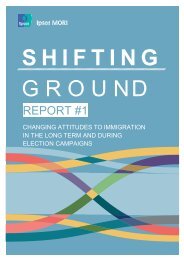You also want an ePaper? Increase the reach of your titles
YUMPU automatically turns print PDFs into web optimized ePapers that Google loves.
martyrs. 423 His views provoked a flurry of activity and he later issued a<br />
clarification of his position explaining:<br />
...we [the British Muslim Forum] encourage British Muslim citizens to play a part in all<br />
aspects of British life. This included pursuing careers where Muslims were under-represented<br />
including the Armed Forces of this country. As citizens of this country, our allegiance must be<br />
demonstrated in all spheres.<br />
[...]<br />
As far as the much contentious issue of<br />
‘martyrdom' is concerned, they were, and are,<br />
Conclusion – Reviving Muslim Service in the Armed Forces<br />
“ The MoD and armed forces appoint faithspecific<br />
chaplains to meet the religious needs<br />
of servicemen and women ”<br />
my personal views and have been supported by<br />
our scholars: anyone making the ultimate<br />
sacrifice of his/her life for their country is<br />
considered by <strong>that</strong> country a national hero and<br />
a martyr. The word martyr is widely used by<br />
countries throughout the world to honour their<br />
heroes. The British Armed Forces are the same. Why should a British Muslim soldier not be<br />
honoured in the same way as any other British soldier? 424<br />
Appealing directly to Muslims<br />
The MoD and armed forces appoint faith-specific chaplains to meet the religious<br />
needs of servicemen and women. In the case of Muslims, the MoD employs a<br />
full-time clerically qualified Muslim chaplain. Our military is both a politically<br />
sensitive organisation and an institution <strong>that</strong> should be equally welcoming for<br />
British citizens of all backgrounds. These significant appointments certainly do<br />
not require interference from self-appointed community groups outside the<br />
formal military structure, which claim to represent what Muslims think. The<br />
armed forces should be able to promote themselves to all British citizens without<br />
reference to activist groups whose central purpose is not the defence of the realm.<br />
The most effective solution both for Muslims and the armed forces is the outreach<br />
work the Muslim chaplain has carried out in the United Kingdom and also in<br />
theatres of operation overseas. In contrast, those who hold advisory roles in the<br />
religious affairs of the armed forces may have insufficient experience of the<br />
demands of life in the military.<br />
The move away from the traditional model of appealing to Muslims through<br />
gatekeeper organisations and sectarian groups means <strong>that</strong> new ways must be<br />
found to reach them. The academic study of Muslim attitudes found <strong>that</strong><br />
Muslims themselves suggested <strong>that</strong> the MoD should target educational<br />
institutions (16 percent) and provide more information specifically targeted at<br />
them about military careers and life in the armed forces (15 percent). 425 This<br />
would require the MoD to directly engage young Muslims in new ways,<br />
possibly through initiating a schools tour with lectures and seminars delivered<br />
by serving Muslim soldiers.<br />
A serving Muslim soldier in the Army told Policy Exchange about his tours of<br />
duty in Iraq, particularly in Mosul and Umm Qasr – where he was able to freely<br />
attend congregational prayers in a local mosque wearing British military uniform<br />
without any problems. Indeed, he explained <strong>that</strong> many Iraqis in the south<br />
423 This is a different Khurshid<br />
Ahmed to the one who is a<br />
member of the Jamaat-e Islami<br />
party in Pakistan and chairman of<br />
the Islamic Foundation in<br />
Leicester.<br />
424 http://www.mpacuk.org/<br />
content/view/3158/102/<br />
425 Asifa Hussain and<br />
Mohammed Ishaq, British<br />
Pakistani Muslims’ Perceptions of<br />
the Armed Forces, Armed Forces<br />
and Society, Vol.28, No. 4,<br />
Summer 2002, p.612<br />
policyexchange.org.uk | 89



